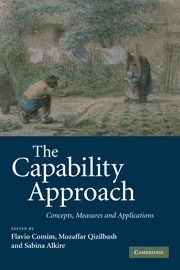Introduction
Published online by Cambridge University Press: 22 September 2009
Summary
Amartya Sen's capability approach has generated remarkable interest in recent years. This volume brings together a selection of papers initially presented at an international conference on the capability approach (CA) held at St Edmund's College, Cambridge in 2001. This conference marked an important turning point in research on the capability approach. It brought together many young scholars who were interested in the approach as well as others who had been working on it for some time. The conference was initially motivated by issues relating to the usefulness of the approach in the particular contexts of poverty and injustice. However, conference papers covered a wide range of topics relating to concepts, measurement and other applications. In this volume, the papers are categorised in terms of these broad and overlapping areas. In 2002 a follow-up conference explored Martha Nussbaum's version of the approach, and annual conferences have been held in subsequent years. Numerous initiatives have since emerged, including the Human Development and Capability Association (www.hd-ca.org). In part as a result of these initiatives, but also quite independently of them, a large literature on the capability approach has emerged.
Amartya Sen's 1980 Tanner lecture, ‘Equality of What?’, set out a broad agenda for debate and further research. While the approach has been extensively discussed, Sabina Alkire suggests in Chapter 1 that work in this area is still at a relatively early stage.
Information
- Type
- Chapter
- Information
- The Capability ApproachConcepts, Measures and Applications, pp. 1 - 25Publisher: Cambridge University PressPrint publication year: 2008
References
Accessibility standard: Unknown
Why this information is here
This section outlines the accessibility features of this content - including support for screen readers, full keyboard navigation and high-contrast display options. This may not be relevant for you.Accessibility Information
- 10
- Cited by
